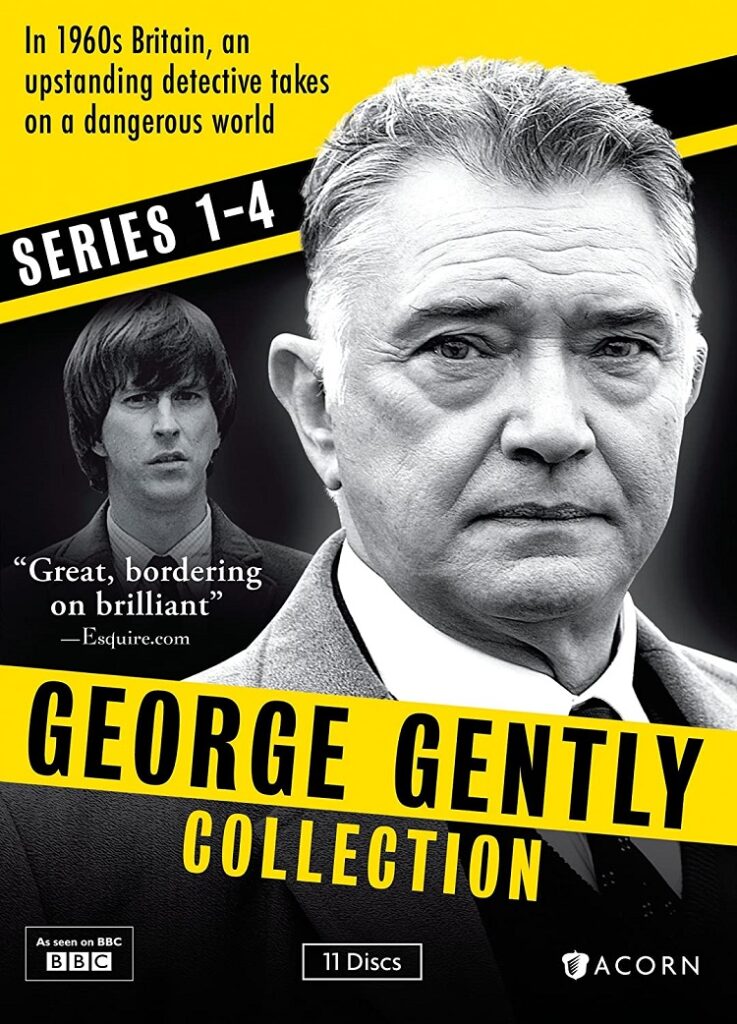
In 1955 author Alan Hunter published a novel entitled Gently Does It, which marked the first appearance of the British police inspector George Gently. To say that the character proved to be very popular in his homeland is a bit of an understatement. From 1955 to 1998, Hunter published roughly one new George Gently novel every year. With such a proven track record, it is a little surprising that it took until 2007 for Gently to move from the printed page to the television screen, but it did. “George Gently” was the title of the pilot of the George Gently series, and it proved to be a winner. The program was picked up, and will begin Season Six very soon.
In England, Inspector George Gently (as it was re-named in season two) airs on the BBC. In the United States, the series has been shown on PBS, but it is a hit-or-miss prospect. I have only been able to catch a couple of episodes on my affiliate because the show is not regularly scheduled. Each time was more a case of dumb luck than anything else. My guess for the reason behind this is the fact that the episodes of Inspector George Gently are really 90-minute TV movies, rather than your typical hour-long cop show. The programs I did see certainly whetted my appetite for more though.
Acorn Media have just released the George Gently Collection: Series 1- 4 as an 11-DVD box set, and it is marvelous. As indicated in the title, this contains the first four seasons, with a full DVD devoted to each episode. By the way, I should mention that what we in the U.S. call a “season,” the Brits call a “series.” Calling it a season or a series is hardly even adequate though, in my opinion these are really movies more than anything else. Be that as it may, Series One consists of three shows, Series Two has four, Series Three has two, and Series Four has two, for a grand total of 11 George Gently entries.
One of the things that sets George Gently apart from other police dramas is the period, as it takes place in the mid-sixties. The first two series are set in 1964, with the next two in 1966. Since the debut of Mad Men in 2007, every program set in that era has been unfavorably compared to it. I really hate that, because nobody ever talks about the shows themselves. An example of this came with the short-lived Pan Am, which was described as “Mad Men in the air.” Actually, it was a terrible show, and deserved to be cancelled, but that description does nothing to explain why it was so bad.
George Gently is not “Brit-cop Mad Men,” okay? For one thing, some of the books which were adapted into programs were originally published in or around the era. The very first George Gently episode following the pilot is “The Burning Man,” which is based on Hunter’s Gently Where the Roads Go, from 1961. Mad Men or not, the ’60s were a time of unprecedented social upheaval, especially in England. This is a juicy background to set your stories in, and always will be.
The “George Gently” pilot shows that the producers not only understood, but knew how to present it, right from the start. The main bad guy is an amphetamine dealer. Drug dealers are not good people, no matter what year it is. But what I like about the way the topic is handled here is that the connections to the world of pop culture are left for the viewers to make. We are not hit over the head with tales of the Mods vs. Rockers riots, as we might have have been in lesser hands. No – this is a personal tale, about some very ugly men, and an inspector who can be kind of an asshole himself. It completely draws you in, and is a great stand-alone story.
In fact, this may be the program’s biggest strength of all. There is continuity in the characters and places, but one could easily play a random disc and have no problem at all in following it. As I said, this is much more like a collection of movies than your typical box set of a weekly police/mystery drama.
Martin Shaw is fantastic as George Gently. When we first meet him in “George Gently,” he is considering retirement, and has just about seen it all. His age brings an undeniable sense of authority to his role as a corrupt-proof inspector. What is so great about this is the fact that he does not come off as some sort of “angel,” quite the contrary. He can (and often is) a complete jerk, but he always gets the job done. He’s fun to watch, even if he does make you cringe at times. A couple of other noteworthy recurring characters are Detective Sergeant John Bacchus (Lee Ingleby) and PC Taylor (Simon Hubbard).
Bonus features in the set include text interviews with Shaw, Ingleby, and producer Peter Flannery. There is also a biography of Shaw, and a 13-minute “Behind the Scenes” segment produced during Series Four. Acorn often includes some very cool booklets with sets like these, and the “Britain in the 1960s – A Peek at George Gently’s Times” is quite intriguing.
I have always had an interest in British television, in part I suppose because it seems a little “exotic.” English slang and whatnot are a bit different, but not so much as to be off-putting, and these programs are not well-known. So discovering George Gently was kind of like finding a hidden treasure for me. The fact that Acorn sets are budget priced is also a huge incentive. It is just really cool to be able to turn other people on to a show like this.
[Editor’s Note: Greg also reviewed George Gently Series 5.]